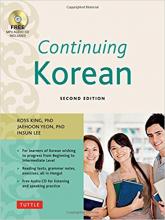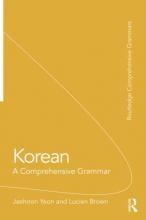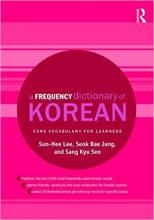Pattern –는 길(에): on the way to
–는 길(에) can be translated as “on the way to” and is used with a verb indicating movement to/from a destination.
Reference: Yeon, J., & Brown, L. (2011). Korean: A Comprehensive Grammar: Routledge.
Pattern (을/를) 통해(서): through, by way of
(을/를) 통해(서) / (을/를) 통하여(서) can be translated as “through, by way of” and is used with nouns to indicate “sources of information” such as persons, institutions, activities, etc.
Reference: King, R., Yeon, J., & Lee, I. (2015). Continuing Korean (Second ed.): Tuttle Publishing.
Ending –거든(요): it’s because, you see
–거든(요) can be translated as “it’s because, you see.” It follows a verb and, in this form, is always ending a sentence (another pattern exists with –거든 in the middle of a sentence, with a different meaning). It is commonly used to add information to what was previously said, provide justification for one’s actions, or referring to something that was said in the past.
B: 할 숙제 많았거든. A: Why did you arrive late?
B: Because I had a lot of homework left.
Reference: Yeon, J., & Brown, L. (2011). Korean: A Comprehensive Grammar: Routledge.
Book Review: Continuing Korean, Second Edition

Continuing Korean, Second Edition by Ross King, Jaehoon Yeon, and Insun Lee is a great textbook for upper beginner/lower intermediate learners of the Korean language. The book is composed of 12 lessons that walk readers through one or two dialogues and a reading passage, vocabulary relevant to the readings, and various grammar points.
The good points about this book:
– The progression in difficulty is very gradual, so it is hard to feel lost or overwhelmed if the lessons
are studied in the right order.
– The book comes with an audio CD containing all the spoken dialogues, words and phrases, making the book a
great investment for autodidacts.
– For the most part, the dialogues are relatable, making it easier to understand the context of use of specific
words.
– The grammar points are well redacted and easy to understand.
Book Review - Korean: A Comprehensive Grammar

Korean: A Comprehensive Grammar by Jaehoon Yeon and Lucien Brown is one of the most useful, if not the only, comprehensive Korean grammar books available in English. The book starts with a very complete refresher on honorifics and the complex pronunciation rules of the Korean language. The rest of the book has one chapter per class of words in the Korean language. The structure of the book goes as follows:
Academics - University Topics
This lesson introduces words to talk about university subjects, the different university degrees, and some examples using these words together in a sentence.
You can review this lesson using these flashcards, and you can also download a PDF of this lesson to take it to go.
Subjects (과목)
| 수학 | mathematics |
| 물리학 | physics |
| 화학 | chemistry |
| 생물학 | biology |
| 과학 | science |
| 공학 | engineering |
| 컴퓨터 공학 | computer science |
| 정보과학 | informatics |
| 경제학 | economics |
| 정치학 | politics |
| 역사학 | history |
| 문학 | literature |
| 경영학 | business administration |
| 언어학 | linguistics |
| 법학 | law |
Verbs
| 졸업하다 | to graduate |
| 학위를 받다 | receive a degree |
| 박사과정을 밟다 [밥따] | to study for a PhD degree |
| 취직하다/취업하다 | to get/find a job |
| …(을/를) 전공하다 | to major in |
| …(을/를) 부전공하다 | to minor in |
University
| 대학(교) | university |
| (수학) 학위 | a degree (in mathematics) |
| 학위 소지자 | person with an academic degree |
| 학사 학위 | bachelor’s degree |
| 석사 학위 | master’s degree |
| 박사 학위 | doctorate |
| (박사) 과정 | course of study (Ph.D. program) |
| 대학생 | university/college student |
| 교환 학생 | exchange student |
| 문학과 | department of literature |
| 학부 | undergraduate studies (college) |
| 대학원 | graduate school |
Examples
Review this lesson
Review the flashcards for this lesson! Click on the buttons or use the keyboard to review the cards. Once you get a card right five times, the card is moved to the known cards stack, and a new card will be added to your working cards stack. Try to learn them all!
Particle: Usage of –에
Common usages of the particle 에
1. Movement towards a location or goal
2. Location in space and time
3. ‘for’ for quantity and price
4. Common expressions
More Examples of –에
References
Using the Internet in Korean
Always wondered how to use Korean websites? While some technology-related words are borrowed from English, a lot of words are proper to Korean, and are sometimes hard to find in dictionary. This lesson includes common Internet nouns and verbs to help you use the Internet.
You can review this lesson using these flashcards, and you can also download a PDF of this lesson to take it to go.
Basics
| 확인(하다) | (to) confirm |
| 취소(하다) | (to) cancel |
| 로그인 | login |
| 회원가입 | registration |
| 계정 | account |
Communication
| 초대 | invitation |
| 게시판 | message board |
| 채팅방 | chatroom |
| 답장 | answer |
| 대화 | conversation |
Online Music and Video
| 음악 | music |
| 노래/가요 | song |
| 가수 | singer |
| 최신곡 | latest songs |
| 국내 | domesting |
| 해외 | overseas |
| 동영상 | video |
| 듣기 | listen |
| 다운(로드) | download |
| 구독 | subscription |
| 인기 [인끼] | popularity |
| 재생목록 [–몽녹] | playlist |
Online Shopping
| 장바구니 | shopping basket |
| 할인 | discount |
| 특가 | special price |
| 무료 | free |
| 구매/구입 | purchase, buying |
| 판매하다 | to sell, deal in |
| 신상품 | new products |
| 인기상품 | popular products |
| 신용카드 | credit card |
| 배송 | delivery |
Actions
| 보내다 | to send |
| 접속하다 | to access |
| 검색하다 | to search |
| 설정하다 | to set up |
| 지우다 | to erase |
| 삭제하다 | to delete |
| 수정하다 | to edit/to amend |
| 복사하다 | to copy |
| 소통하다 | to communicate |
| 가입하다 | join, become a member of |
| 저장하다 | to save (computer) |
| 이용하다 | to use |
| 공유하다 | to share |
| 선택하다 | to select, choose |
Other Words
| 알림 | notification |
| 댓글 | comment (Internet) |
| 정보 | information |
| 즐겨찾기 | bookmark (Internet) |
| 추천 | recommendation |
| 제안 | proposal, suggestion |
| 설치 | install |
| 혜택 | benefit |
| 제목 | title |
| 전체 | the whole |
Services
| 이메일 | |
| 지도 | map |
| 번역 | translation |
| 사전 | dictionary |
| 사진 | picture |
| 앨범 | album |
| 위치 | location |
| 뉴스 | news |
| 날씨 | weather |
Review this lesson
Review the flashcards for this lesson! Click on the buttons or use the keyboard to review the cards. Once you get a card right five times, the card is moved to the known cards stack, and a new card will be added to your working cards stack. Try to learn them all!
Book Review: A Frequency Dictionary of Korean

An invaluable resource for Korean learners, Routledge's A Frequency Dictionary of Korean: Core Vocabulary for Learners catalogs the 5,000 most frequent Korean words with their pronunciation and an example sentence for each. This book is very useful for several reasons:
– Thematic vocabulary lists: 24 inserts throughout the book are dedicated to the most frequent words about a
single topic. Useful to quickly memorize conversational words. See the sample page below for an example.
– An alphabetical index at the end of the book helps quickly find any Korean word present in the book.
– Each word is accompanied by a sample sentence. Really useful to understand how the word fits within a
sentence and the grammatical patterns associated with them.
장어 - Eel
Eel is a popular fish in East Asian countries. Korea has a lot of dishes featuring eel, some of the most popular being 장어구이, or grilled eel; 장어강정, or eel with a sweet soy sauce glaze, and 장어덮밥, or eel over rice.

The popular saying in Korea is that men should eat eel to improve their performance behind closed doors…